Victoria records 179 COVID-19 cases and nine new deaths
Victoria has recorded its lowest daily virus cases in almost six weeks, but Premier Daniel Andrews warned the fight isn’t over. It comes as the source of thousands of cases remains a mystery to authorities.
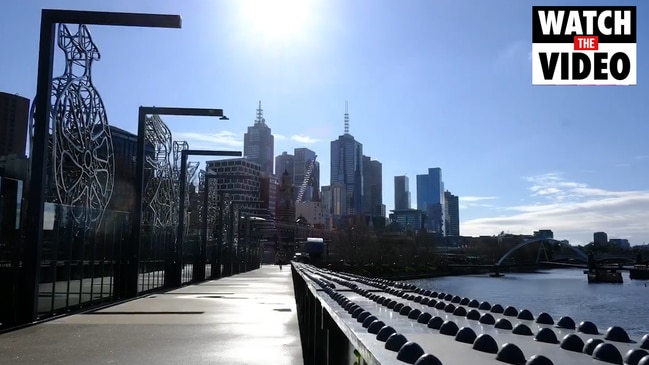
Coronavirus
Don't miss out on the headlines from Coronavirus. Followed categories will be added to My News.
This coronavirus article is unlocked and free to read in the interest of community health and safety. Get full digital access to trusted news from the Herald Sun and Leader for just $1 for the first 28 days.
Victoria has recorded 179 new coronavirus cases - the lowest daily increase since July 13.
Another nine Victorians have died from the virus in the past 24 hours, with seven of the deaths linked to aged care outbreaks.
The source of 3808 cases remains a mystery.
Active cases among healthcare workers continues to be an issue for the state, with 668 active cases.
Aged care settings account for 1732 of the state’s 4421 active cases.
Statewide, active cases have fallen by another 443.
Victoria’s chief health officer Brett Sutton said the large number of aged care and healthcare positive cases was concerning, but it was an indication the virus wasn’t spreading through unknown community transmission.
There are 66 paramedics off work due to coronavirus, including six who’ve tested positive to the virus.
Fifteen of the state’s new cases are in regional Victoria, bringing the active cases to 269.
Premier Daniel Andrews said it was good to see cases in regional Victoria declining and the daily tally in the hundreds, but there was no room for complacency.
“There’s no way we can assume that this is over. It is an ultra-marathon, and we’re not halfway yet,” he said.
“We just have to keep pushing forward to make sure that we drive these numbers down even further.”
There are 626 Victorians fighting the virus in hospital, including 40 in ICU and 25 on ventilators.
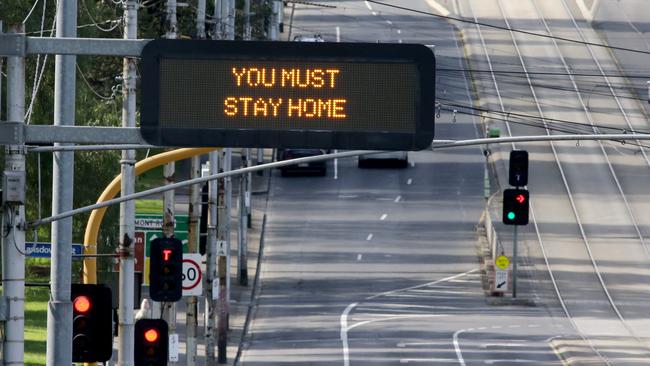
‘TOO EARLY’ TO TALK ABOUT EASING OF RESTRICTIONS
Mr Andrews said it was way too early to be talking about what easing of restrictions in Victoria would look like.
“That’s not designed to, in any way, dispirit people or take away sense of hope,” he said.
“We can be hopeful about these numbers. We can be positive about these numbers. But that can’t be accompanied by any sense of complacency.”
He said talk of easing of restrictions will occur when the “numbers tell us that we have defeated the second wave”.
“It will not be in a search to be popular ending this fight too early and really just beginning the process of a third wave. We’ve got to do everything we can to avoid that,” Mr Andrews said.
Prof Sutton said he knew people wanted a level of certainty about the easing of restrictions, but it was important to continue watching the numbers week by week.
“It’s certainly coming down at a decent rate now and is looking to be on track for mid-September,” he said.
Stage four restrictions are due to end on September 13.
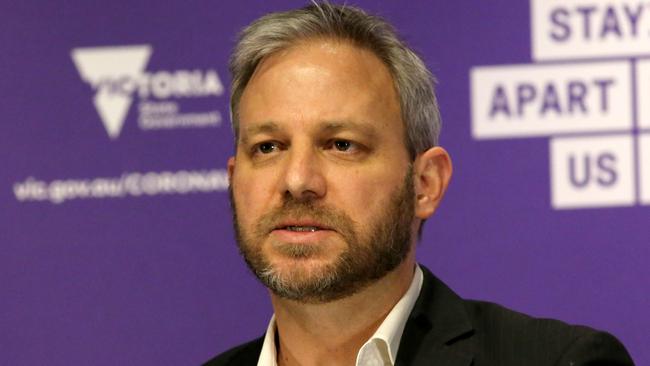
‘CHALLENGING’ WEEKS AHEAD
Prof Sutton said he would be “really gratified” if the daily cases dropped to single figures by the time stage four restrictions were reviewed, but he wasn’t convinced it would.
“I think it’s possible, but I think there are really significant challenges to get there,” he said.
He cited “complex outbreak settings” such as the aged care and disability sectors and health care workers, as the key challenges.
He said he wanted to see double-digit case numbers before contemplating an end to stage 4 restrictions.
“I‘d love us to be below 50.”
Overnight, 42 cases were linked to outbreaks or complex cases overnight, which was a “reasonable chunk”.
Since the pandemic began, there have been 17,852 cases in Victoria and 385 deaths.
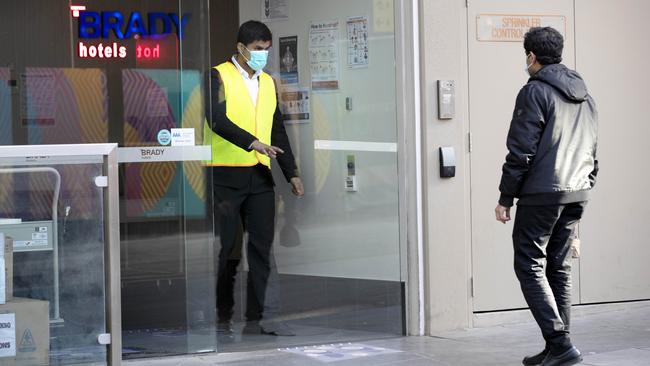
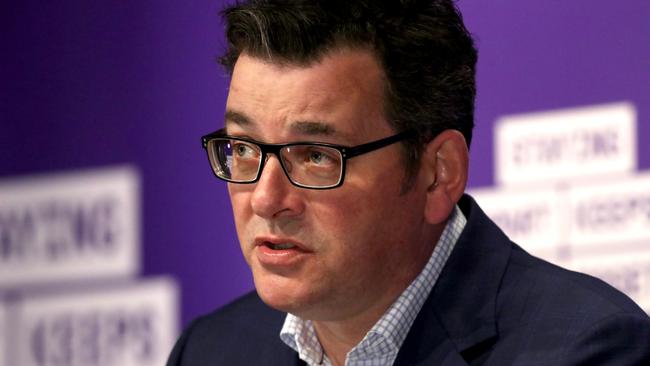
VICTORIAN RESPONSE CENTRE ESTABLISHED
Mr Andrews announced a $15 million commitment to set up a Victorian Disability Response Centre in a bit to reduce the mobility of that workforce and stop them visiting multiple sites.
The cost will be split between the state and federal governments.
“That $15 million... that’ll be about compensating workers who may be out of pocket because they only work at one site rather than a multitude of sites that would be their normal working week,” he said.
BALANCING HARMS A ‘TERRIBLE DILEMMA’
Balancing the psychological harms caused by ongoing coronavirus restrictions was a terrible dilemma, Prof Sutton said.
“It’s not easy, and it’s not just for me to address - the whole of government is looking at the potential impacts and all of the things that they’re trying to do to reduce those awful harms of isolation and the psychological and health harms, and harms from domestic violence that arise,” he said.
“But for me...if you do not address the numbers in terms of coronavirus infections, and the spike that we saw either in the first wave or in the second wave, the trajectory of not dealing with that is literally 15,000-20,000 cases per day.
“And if... the number of deaths we’re seeing now is happening with hundreds of cases a day, you can imagine what the burden of illness and death is with thousands of cases a day.”
144 RULEBREAKERS FINED
Police have fined another 144 rulebreakers, including 30 people who were not wearing a mask and 45 who breached curfew in the past 24 hours.
Among those fined was a group of males driving from Werribee to Dandenong to visit friends and a woman from Port Phillip caught in North Melbourne driving a friend to another friend’s home.
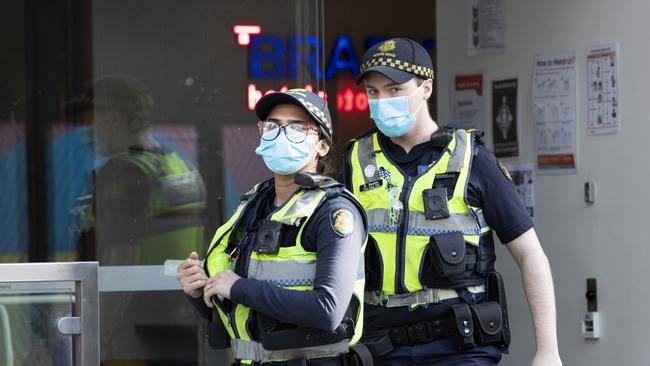
BID TO CONTROL HOW INQUIRY IS REPORTED ON
The Department of Health and Human Services has made an extraordinary bid to control how the media reports certain evidence presented to the COVID-19 hotel quarantine inquiry overseen by former judge Jennifer Coate.
In an open hearing on Thursday, a nurse claimed a guest who had suicided at one of Victoria’s quarantine hotels was not discovered “for a couple of days”.
The experienced nurse, Michael Tait, who worked mainly at Crown Metropol, said in evidence that a person had taken their life at the Pan Pacific Hotel at South Wharf.
During cross examination of Mr Tait, the audio was muted and the media and public could not hear what was said, although a transcript was later provided.
In it, he said that it was a rumour the person’s body went undiscovered for several days, and he did not know if it were true.
The DHHS tried to get the media to retract reporting of his claim, saying it was “false’’ and “inaccurate’’ — even though they led no evidence as to the accuracy or otherwise of the key claim.
DHHS now seeks an order that media is legally forced to report Mr Tait’s qualifying information if his original statement regarding the alleged suicide is reported.
Any media that reported the allegation without also reporting Mr Tait said he had heard the information as a rumour potentially faces criminal charges.
The maximum penalty for the charges is $100,000 or five years in prison.
The Herald Sun and other media are fighting the application in a hearing set for Friday. Media lawyer John-Paul Cashen, will represent the Herald Sun.
“DHHS wants an order that says media outlets must report the government version of events or they will be breaking the law. That’s propaganda, and it’s simply not acceptable,” Mr Cashen, who also acts as a company lawyer for the Herald Sun, said.
“Occasionally orders are made prohibiting what people can say but they should never dictate what a media outlet must say. These orders seek to do that.
“Media outlets shouldn’t have the government trying to dictate how they report on a public inquiry.
“A free press is essential in keeping the government honest at a time when large parts of the political system are being tested.” Although the DHHS was seeking a suppression order, Mr Cashen said it was not substance trying to suppress information but to dictate how information was reported.
Ms Coate has the power to make a suppression order under the inquiries act.
On August 5, Ms Coate said: “I am determined in this inquiry to conduct it with the forensic rigour and completeness that is expected of me and that is the only outcome you should expect.”
Premier Daniel Andrews previously said he was “very confident that that process will give us the answers that we are each entitled to”.
Shadow Attorney-General Ed O’Donohue said Victorians expected the inquiry to be transparent “because that’s what has been promised”.
“Daniel Andrews and Jenny Mikakos have failed to come clean about the botched hotel quarantine program,” Mr O’Donohue said.
“After months of clever word games and covering up the truth, it’s critical this promise made by the Andrews Labor Government is now honoured.
“With Victorian family businesses going to the wall due to the gross mismanagement of the Andrews Labor Government, this Inquiry must be open and accessible to the community, there can be no more cover ups.”
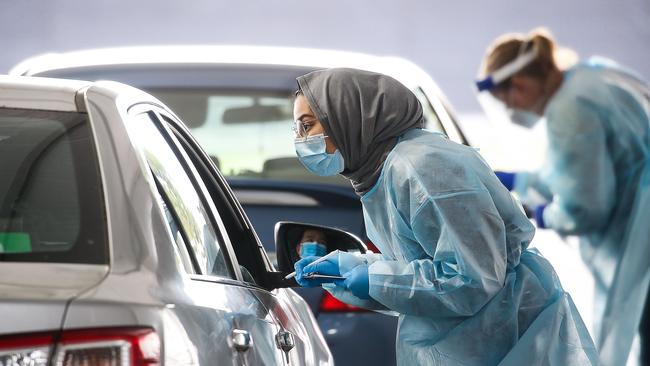
PLEA FOR INTERSTATE DOCTORS AND NURSES
One of Melbourne’s biggest hospitals has issued an urgent call to other states and even to New Zealand for more doctors and nurses to help fight COVID-19.
Fitzroy’s St Vincent’s hospital has felt the full force of surging coronavirus admissions, as well as having staff absent through contracting it.
It has issued the SOS for healthcare workers who can spare a couple of months working in Melbourne.
In an online advert by the hospital, St Vincent’s staff warn Victorians and their health system “have been hit hard by the pandemic and our hospitals are stretched to the limit”.
“We are receiving COVID-19 patients every day who need our help on top of our regular intake of cases, which is why we need you,” the medical staff say.
“We’ll cover all your flights and accommodation, as well as salary.
“This invitation isn’t made lightly — you may be working in a COVID-positive environment and the work will be tough. It’s a big job.
“This is your chance to make a powerful difference at a time when it’s really needed.”
Generous doctors and nurses who have come from interstate to strengthen Victoria’s frontline are the latest inspirational figures to join the Herald Sun’s Melbourne Strong campaign
White Island volcano survivor Stephanie Browitt, Walter Mikac, who wife and daughters were killed in the Port Arthur massacre, Bali bombing survivor Jason McCartney and Olivia Newton-John have offered words of hope during lockdown.
Interstate arrivals are already bolstering efforts in hospitals such as St Vincent’s but they warn more help is needed as community transmission increases pressure on the health system.
There are 753 active coronavirus cases linked to healthcare workers, with a total of 2563 professionals in the industry infected since the start of the pandemic.
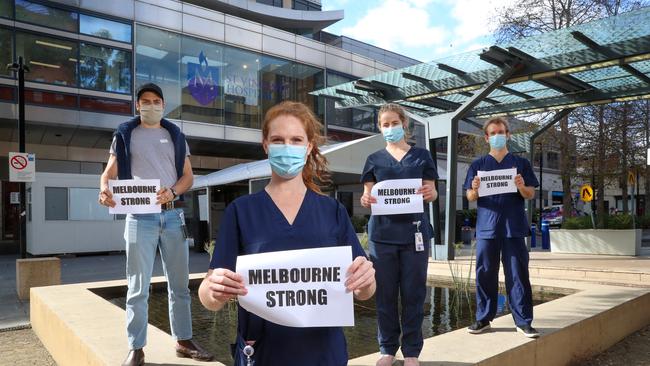
State government figures indicate just 15 per cent of cases in this sector are picked up at work, and dedicated contact tracers are now working in hospitals to stop the spread of infections among staff and patients.
Andy Clarke, a doctor in St Vincent’s geriatric evaluation and management wing, moved to Melbourne from Adelaide to join the fight against the virus.
He said staff worked hard to keep up with the pressures of recent outbreaks.
“It’s an interesting time to be working in medicine and I would encourage anyone who might be able to come from interstate to think about it as an option,” he said.
“There are definitely roles that need to be filled, and increased demand for skilled workers as we fight this virus.
“We’re doing the best we can. Everybody is working well and dealing with the challenge of these unprecedented times.
“Things change quickly and we have to adapt with them. As a unit the people here are very good at banding together.”
Health Minister Jenny Mikakos said Australians were all working together to respond to the global pandemic.
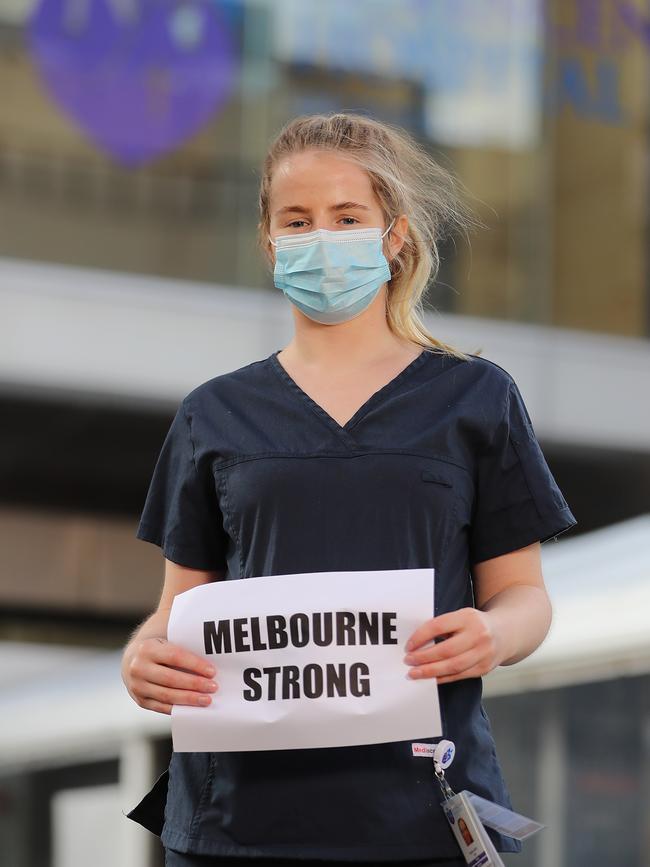
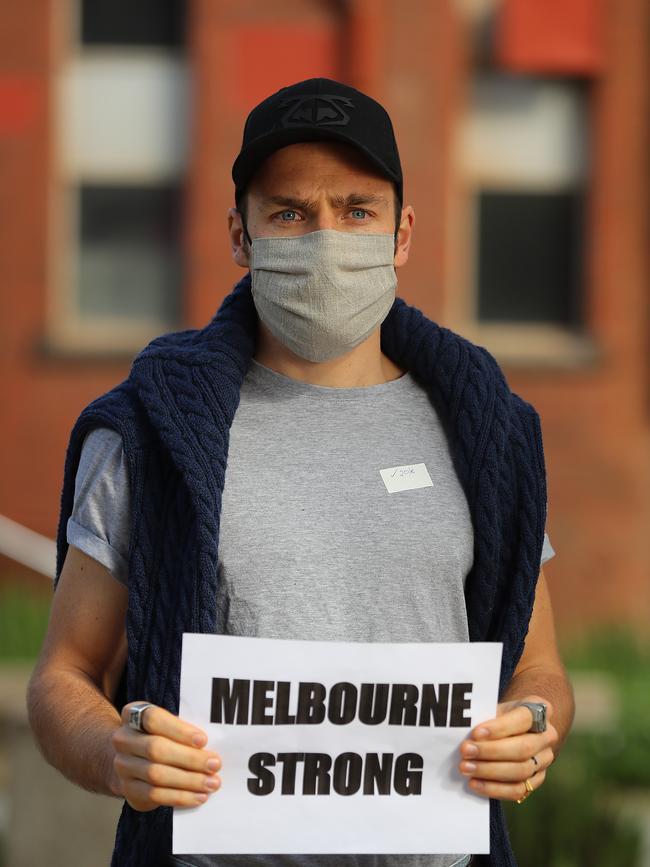
“Just like we do during bushfires and other emergencies,” she said. “We’re incredibly grateful for the support from our interstate colleagues, including nearly 70 healthcare workers stationed in our testing sites to help us get the best statewide picture of the virus.”
More than 170 ADF personnel are supporting the response to the aged-care outbreaks in Victoria while AUSMAT teams have been boosted by 25 people from across the country.
The South Australian and Western Australian governments have also supplied additional staff in this sector.
Federal Health Minister Greg Hunt said the pandemic was still “incredibly tough”.
“Few know this better than the dedicated doctors and nurses who are on the frontline of the fight against COVID-19 each and every day, often putting their own health and wellbeing at great risk to protect lives,” he said.
“They are truly heroes. Their strength, their resilience is recognised and appreciated by every Australian and by governments at all levels. Their commitment and achievement is extraordinary.
“What has also been extraordinary has been the coming together of doctors and nurses right around the country — in particular, to help Victoria as it fights this second wave.”
Mr Hunt said the support from across the country was similar to that of a family.
“The sense of ‘we’re in this together’ among doctors and nurses from all states has been overwhelming,” he said.
ST VINCENT’S MELBOURNE TRIALS TRUMP-SPRUIKED MALARIA DRUG
A Melbourne hospital has begun recruiting for a clinical trial of a controversial drug promoted by Donald Trump as a possible treatment for coronavirus.
St Vincent’s Hospital Melbourne is taking part in the trial that will look at whether the malaria medication hydroxychloroquine can protect healthcare workers from contracting coronavirus while caring for positive patients.
The study is going ahead, led by the Walter and Eliza Hall Institute of Medical Research, despite the official advice from the Australian Government’s Therapeutic Goods Administration “strongly discouraging” its use as a treatment for COVID-19.
It’s understood the trial will examine whether the drug can reduce the risk of coronavirus infection prior to exposure and not as a treatment option.
The TGA said patients could be treated with hydroxychloroquine if they were enrolled in a clinical trial with safety monitoring protocols and oversight by a human research ethics committee.
- Jack Paynter
NEW HOPE AS VICTORIA’S ACTIVE CASES PLUNGE
Thousands of Victorians have recovered from coronavirus, with the state’s total of active cases falling by almost a third — but authorities remain guarded on how and when restrictions will be lifted.
In the first major sign of recovery, the active caseload plunged by 2291 on Thursday — from 7155 to 4864.
Deputy Chief Health Officer Allen Cheng revealed thousands of people had been cleared of the virus and allowed out of isolation.
He also flagged that talks about easing restrictions were happening behind the scenes.
“That’s a discussion that we’re having over the next week or so,” Prof Cheng said on Thursday.
“It’s the long-term trends that I’m looking for.
“We’re hopeful that by next week, (the case numbers will) continue to go down.”
When asked about the threshold for restrictions to be lifted, Prof Cheng declined to give an exact figure, but said “single digits or even low double digits” of new cases, with no so-called mystery cases.
As it stands, stage four restrictions remain in place until at least September 13.
Premier Daniel Andrews would also not be drawn on when restrictions could be lifted, saying it was not a “crystal ball” scenario.
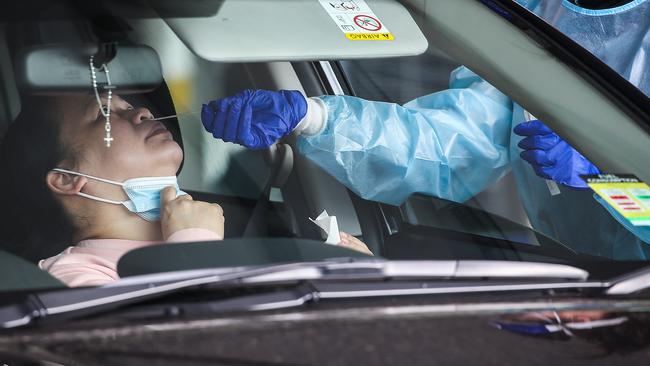
“I don't want to set a day,” he said. “In our third week (of stage four lockdown) we just can’t extrapolate from that data where we are going to be in a week’s time, and where we are going to be in three weeks.
“But we would always look to be as proportionate to the challenge as possible, and if something like the curfew was deemed to be no longer necessary then it would come off. It won’t be imposed for any longer than it needs to be.”
Following the welcome drop in infections, more than a third of the state’s remaining active cases are in aged care.
Currently 1811 residents are battling the virus, and healthcare workers accounted for another 753 cases.
Eight of the 13 overnight deaths were linked to aged-care, including a man in his 70s, six women in their 80s and five women and one man in their 90s.
The state’s death toll rose to 376. A further 622 people were in hospital, including 43 in ICU and 28 on ventilators.
Regional Victoria had 295 active cases, with 118 of those in Greater Geelong and 27 in Greater Bendigo.
The major new cluster which has emerged at Frankston Hospital grew to 51 cases, including staff.
Mr Andrews has previously raised concerns Victorian health workers appeared not to be getting the coronavirus through the obvious work setting, prompting an ongoing investigation into how it was spreading.
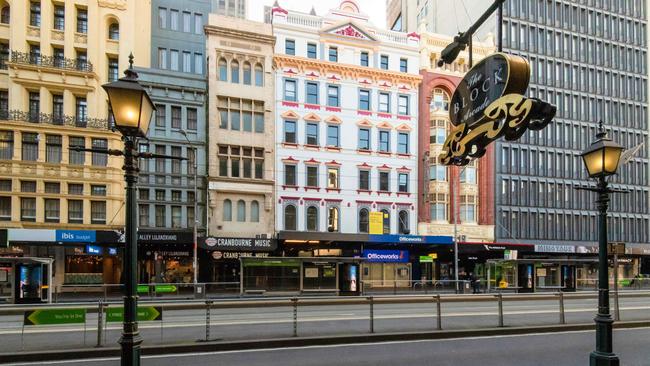
“It's obviously very challenging to get all the data,” he said.
“But our concern is to better understand whether it is patients who are infecting staff or is it staff infecting other staff, and has it come from outside the community in some of these settings?
“We are hopeful to come back with some really significant analysis.”
The Department of Health and Human Services is also investigating cases linked to Peninsula Health, which runs Frankston Hospital.
Epping Gardens Aged Care in Epping remains one of the state’s biggest active outbreak with 209 cases. The Bertocchi Smallgoods cluster in Thomastown also has 209 cases.
In total, 12,334 Victorians have now recovered from COVID-19.
COVID-19 FUNDRAISING ATTEMPT LEAVES DONORS DIVIDED
Hospital fundraisers are targeting people tested for COVID-19 for donations of up to $250 to protect frontline workers.
The Northern Health Foundation has used details of people tested for coronavirus in a mass mailout begging for donations, saying they need to raise a further $50,000 to buy equipment.
The controversial letter urged for “help in the fight against COVID-19” saying it has placed a big strain on frontline staff.
“Our nurses, doctors and dedicated staff working on the frontline can risk their own personal safety just by doing their job,” the letter said.
“They are working long exhausting hours and spending time away from their families so that we can stay safe and receive the best care.”
The foundation, which provides and manages donations to Northern Health, has already raised $200,000.
It asked potential donors for gifts starting from $50 and said the pandemic had stretched workers to “breaking point”.
“The people who look after you and your family must be protected. They are our last line of defence against this horrible disease,” the letter said.
One man, who did not want to be named, said he was appalled he was targeted after his wife provided her details as part of the registration process at the hospital to receive a COVID-19 test.
“Why has this information been used to add to the hospital’s mailout list to request donations? I am appalled at the gross misuse of my wife’s details for this purpose,” he said.
The state government has repeatedly refuted suggestions of a shortage of protective equipment across Victorian hospitals.
“If this is true, why is Northern Health and by default our Northern Hospital requesting donations to support their staff with equipment to respond to COVID?” the man said.
Opposition health spokeswoman Georgie Crozier said the letter was a concerning breach of privacy.
“If the Andrews Labor government provided our frontline workers with the protective equipment they need to stay safe, there would be no need for hospitals to pass the collection plate around to buy their own,” she said.
“This is a shocking breach of privacy that the Andrews Labor government would on one hand collect private information of people being tested for COVID-19, only to use it to send requests for money.”
A Northern Health spokesman defended the move.
“The Northern Health Foundation regularly send letters and newsletters to donors and past patients … and provide them with opportunities to support the work of the hospital,” she said. “The Northern Health Foundation has supported Northern Health for many years, funding state-of the-art equipment and ongoing medical research through philanthropic support, in line with hospitals right across Australia.”
A Government spokeswoman said: “Northern Health is well equipped to support patients who require treatment for COVID-19.”
COULD REGO PAYMENTS FREEZE UNTIL LOCKDOWN’S END?
Melbourne motorists should be granted a registration holiday during stage four restrictions to support battling families, the state Opposition has said.
Opposition roads spokesman Brad Battin this week urged the government to give fee relief to those struggling and unable to use their cars.
“We all know it is Daniel Andrews’ botched hotel quarantine that has seen stage four imposed on all in metropolitan Melbourne,” Mr Battin said.
“The least he can do is extend their (vehicle) registrations for … at least six weeks.
“Registrations are computerised, it’s an easy change to make and I am calling on Daniel Andrews to implement this relief immediately.”
The Andrews government has frozen registration fees for 2020-21 due to the economic effects of the pandemic.
A state government spokesman said other fees, charges and levies had also been frozen.
“Short-term registration can also help to relieve financial pressure, giving everyone the option to pay their vehicle registration at three or six-month intervals,” he said.
- Kieran Rooney
MORE NEWS
HOW LIFE COULD LOOK IF RESTRICTIONS ARE EASED IN SEPTEMBER
